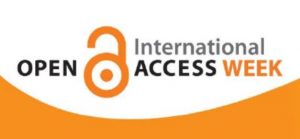 International Open Access Week is in its tenth year between October 22 and 26. The University of Reading is holding a series of events to highlight the importance of Open Access, in theory and practice, throughout the week.
International Open Access Week is in its tenth year between October 22 and 26. The University of Reading is holding a series of events to highlight the importance of Open Access, in theory and practice, throughout the week.
The principle behind Open Access is that access to knowledge should be available to anyone. This is a core value of the University of Reading, and the University wholeheartedly supports efforts to bring the output of our research into the public domain.
Reading’s Open Access Policy highlights the University’s commitment to Open Access. But it’s not just important because it’s the right thing to do: it’s also a critical consideration for assessment in REF 2021. To stay compliant with University, funder and REF guidelines, researchers must deposit all research outputs in CentAUR as soon as they are accepted for publication. Read the University’s guidelines on Open Access for the REF for more information.
During Open Access Week, the University of Reading is hosting a number of events:
Drop in: Ask the CentAUR!
Monday 22 October, 1pm-2pm
Edith Morley G74
A ‘drop in’ event to ask any question about Open Access with the Library’s CentAUR Team. Do you know your ROSS from your REF? What’s the difference between ‘Open Access’ and ‘open access’? How does the University’s central repository for research, CentAUR, work in practice? The CentAUR team will be on hand to answer your open access questions.
If you can’t make it person, tweet your question to @UniRdg_CentAUR using the hashtag #askthecentaur and get an answer direct from the horse’s… sorry, the CentAUR’s mouth.
Watch: ‘Paywall’
Wednesday 24 October, 1pm-2.30pm
Edith Morley G27
Join us for a screening of Paywall: The Business of Scholarship, a documentary about academic publishing and the tug of war over paywalls.
Play: The Game of Open Access
Friday 26 October, 1pm-2pm
Carrington 201
Bring your lunch and play a board game with a difference… a game all about open access! (An open access board game, of course.)
Simpler than snap, classier than chess, and significantly quicker than Monopoly, this game will help you develop an understanding of open access, at every stage of the research process.
